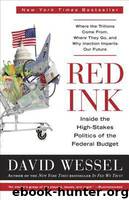Red Ink: Inside the High-Stakes Politics of the Federal Budget by Wessel David

Author:Wessel, David [Wessel, David]
Language: eng
Format: epub
Tags: Business
ISBN: 9780770436155
Goodreads: 13531685
Publisher: Crown Business
Published: 2012-07-30T00:00:00+00:00
Why such a declining share? In part, because Congress has offered corporations all sorts of tax breaks. And, in part, because businesses have exploited loopholes or shifted profits overseas or legally organized themselves into entities that aren’t subject to the corporate tax. (That last factor is a big one: in 1980, 22 percent of all U.S. business profits were booked by outfits organized so they didn’t pay corporate taxes, though their owners—like partners in a law firm—paid individual income taxes on the profits. In 2008, 73 percent of all business profits were in entities that didn’t pay corporate taxes.)
With competition from abroad to attract businesses increasingly stiff, most economists and many politicians challenge the wisdom of relying more heavily on corporate taxes. Both the White House and congressional Republicans were flirting with corporate tax reform in early 2012, but both were talking about rearranging the burden among businesses, not raising more money from corporations.
The federal government’s only explicit tax on wealth—the estate tax levied on the money that the wealthy leave when they die—was an important source of revenue in the 1930s but has been on the wane ever since. Last year, it accounted for much less than 1 percent of revenues. Unlike most other developed countries, the United States at the federal level doesn’t rely on broad sales taxes on consumer spending, such as the value-added tax common abroad.
This book focuses on the federal government, but Americans pay state and local taxes, too. For every $1 the federal government raised in 2011, state and local governments collected another 58 cents from sales, property, income, and other taxes. That measure recently has been distorted by the federal government’s ability to cut taxes and run deficits during a recession; most states can’t do that. But even before the recession, the weight of state and local taxes rose from 44 cents for every $1 of federal taxes in 2001 to 49 cents in 2007. Of course, the burden varies widely by state. State and local governments in New York take about 15 percent of personal income, while in Missouri they take about 9 percent.
Download
This site does not store any files on its server. We only index and link to content provided by other sites. Please contact the content providers to delete copyright contents if any and email us, we'll remove relevant links or contents immediately.
International Integration of the Brazilian Economy by Elias C. Grivoyannis(110400)
The Radium Girls by Kate Moore(12018)
Turbulence by E. J. Noyes(8040)
Nudge - Improving Decisions about Health, Wealth, and Happiness by Thaler Sunstein(7693)
The Black Swan by Nassim Nicholas Taleb(7110)
Rich Dad Poor Dad by Robert T. Kiyosaki(6612)
Pioneering Portfolio Management by David F. Swensen(6289)
Man-made Catastrophes and Risk Information Concealment by Dmitry Chernov & Didier Sornette(6007)
Zero to One by Peter Thiel(5787)
Secrecy World by Jake Bernstein(4741)
Millionaire: The Philanderer, Gambler, and Duelist Who Invented Modern Finance by Janet Gleeson(4469)
The Age of Surveillance Capitalism by Shoshana Zuboff(4279)
Skin in the Game by Nassim Nicholas Taleb(4239)
The Money Culture by Michael Lewis(4198)
Bullshit Jobs by David Graeber(4179)
Skin in the Game: Hidden Asymmetries in Daily Life by Nassim Nicholas Taleb(3992)
The Dhandho Investor by Mohnish Pabrai(3760)
The Wisdom of Finance by Mihir Desai(3735)
Blockchain Basics by Daniel Drescher(3574)
